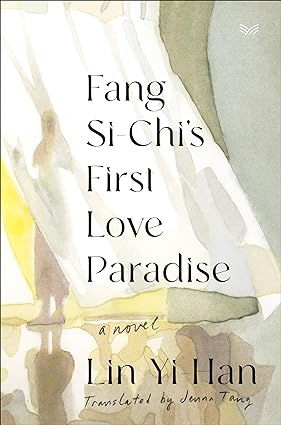What do you think?
Rate this book


265 pages, Kindle Edition
First published February 7, 2017
Liu Yi-Ting and Fang Si-Chi are thirteen-year-old best friends, coming from well-to-do families, living in the same apartment complex, studying in the same school, and fond of the Russian classics. The first difference is that Yi-Ting is somewhat plain while Si-Chi is stunning. The second difference comes out only some years later, when Yi-Ting learns that Si-Chi has gone through something earth-shattering in the last five years, a fact that is revealed by Si-Chi’s journals only after she loses her mental stability. What happened to her in the interim?
The story comes to us in the third person perspective of various characters.
Con người chỉ được sống một lần duy nhất, nhưng cũng có thể sẽ phải chết nhiều lần.
Đè miết nàng lên trên các tác phẩm đã đoạt giải Nobel, đè đến Nobel cũng chấn động từng hồi. Nói với nàng rằng nàng chính là ánh sáng giữa những tháng năm trung niên mịt mùng của gã, bóp vụn nàng trong muôn lời dụ ngọt, chơi vơi giữa biển chữ mà những nam sinh trung học chưa thể nào biết tới, dùng ngôn từ mà huyễn hoặc rằng nàng đã trưởng thành, và để cho linh hồn của nàng lừa dối chính cơ thể mình.
Gã cảm thấy xã hội cấm kỵ tình dục quá tiện lợi, cưỡng hiếp một cô gái, cả thế giới cho rằng đó là lỗi của chính nàng, ngay cả bản thân nàng cũng cảm thấy đó là lỗi của mình. Cảm giác tội lỗi sẽ đưa nàng trở lại bên gã một lần nữa.
Mẹ Phòng ngạc nhiên nhìn nàng, đáp: “Giáo dục giới tính cái gì? Giáo dục giới tính là dành cho những kẻ có nhu cầu tình dục. Thứ giáo dục đó chẳng phải chính là như vậy sao?”
"Em có thể viết một cuốn sách đầy sự giận dữ, thử nghĩ xem, mọi người đọc sách của em cảm thấy may mắn biết bao, họ có thể nhìn thấy mặt trái của thế giới mà không cần chạm vào nó."
“Every time Si-Chi felt this way about a boy her age, she imagined her diary surfacing on her skin and tattooing her with its words.”
“She wanted to trample herself. She spent half of her life accepting a demon, but that demon had forsaken her. She realized that the filthiest thing was not filth itself; it was more about how even filth became disgusted by her.”
“Maybe this [miscarriage] was destined to happen. I don’t want to see a baby born to a family like ours. The baby’s good, too good for me.”
“When spending time with Lee Guo-Hua, Hsiao-Chi had once thought that even if she equally divided her pain and gave a piece to every person living on Earth, all of them would be in so much pain that they wouldn’t be able to catch their breath.”
“[They] would understand many years later that Teacher Lee had intentionally made [his daughter] stupid because he knew very well what a highly literate person could do to him.”
“He shot his whole load into those beautiful girls: the grandiose climax, the seduction of the epics, and the glorious ideology of getting into the right college.”
“The English teacher would never understand the eternal peace Lee Guo-Hua felt when he first heard that a girl he slept with died by suicide…. To end your life for a man was the greatest compliment you could give to him.”
“'I heard there’s a student who’s in a relationship with a teacher.’ ‘Who?’ ‘I don’t know her.’ ‘Already a seductress at such a young age.’”
“I love you, but I also feel guilty. Can you stop making me feel this way? I’m sick.”
“It’s all your fault. You’re too beautiful…”
“Don’t ever give me a reason to stop loving you, okay?”
“If I gave up on myself first, then he wouldn’t be able to abandon me again. We said we’d love the teacher anyway. Your lover can do whatever he wants to you, can’t he?”
“Nobody liked [her] anymore. But if Teacher still liked her, that counted for something. She would do anything for Teacher.”
“…a sea cucumber lay on the big porcelain plate like a long turd deep in the toilet that the maid had scrubbed to a brilliant shine.”
“The bitter wind pierced her face like an acupuncture treatment that a nonbeliever in Chinese medicine might resort to after no success with Western medicine.”
“…her forehead was as full as a burp from a satisfied baby.”
“Her heart was as desolate as the empty desk.”
“Her eyelashes resembled Marie Antoinette’s favored fan.”
“Literature is the most useless thing and the funniest kind of uselessness. I’ve written so much, and yet I can’t save anyone. I can’t even save myself.”